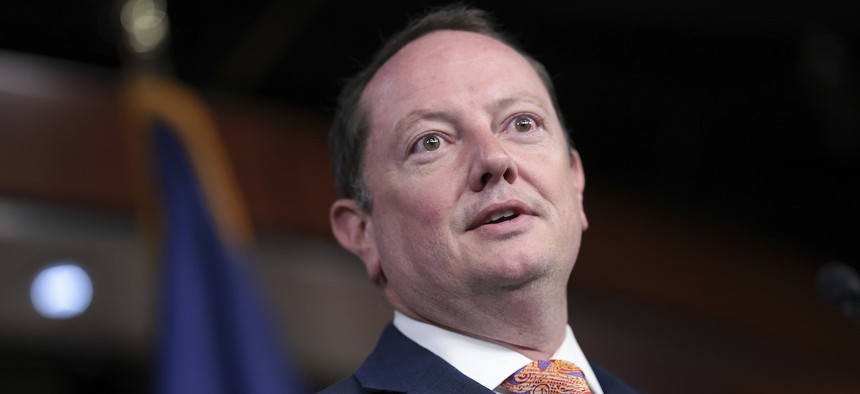
Rep. Eric Burlison, R-Mo., speaks during a press conference at the U.S. Capitol on July 20, 2023. Burlison told “Government Executive” that allowing union dues to be deducted directly from federal workers’ paychecks amounts to “preferential treatment” for labor groups. Win McNamee/Getty Images
Bill to ban agencies from deducting union dues from feds’ paychecks pushed in House
Unions say the measure is designed not to help workers, but rather to interfere with their decision whether to join a labor organization.
A group of conservative House lawmakers have introduced legislation that would eliminate federal employees’ ability to pay union dues directly from their pay checks, attracting outcry from labor groups.
For decades, federal employees who join a union have been able to have their dues deducted directly from their paychecks, similarly to how employees’ portion of health care premiums and retirement contributions are collected. Many private sector employers also offer union dues withholding if their workplaces are unionized.
But a bill introduced last month by Rep. Eric Burlison, R-Mo., would do away with that longstanding practice. The Paycheck Protection Act (H.R. 4971) would bar federal agencies and the U.S. Postal Service from automatically deducting union dues from employees’ pay checks. The measure is cosponsored by Reps. Mary Miller, R-Ill., Bob Good, R-Va., Andrew Ogles, R-Tenn., Nancy Mace, R-S.C., Harriet Hageman, R-Wyo., Thomas Tiffany and Glenn Grothman, both R-Wis.
In a statement to Government Executive, Burlison said allowing union dues to be deducted directly from federal workers’ paychecks amounts to “preferential treatment” for labor groups.
“Whether or not a worker chooses to join a union and pay dues is up to them,” he said. “The federal government should not help unions do their job by collecting dues on their behalf. The Paycheck Protection Act is essential to foster transparency and help federal workers make more informed decisions about their hard-earned wages."
But federal employee unions blasted the proposal, arguing that making it harder for federal workers to pay their union dues is designed to interfere with their decision to join a labor organization, which is already voluntary.
“[The bill] is a perennial effort to undermine federal employees’ choice to join or not join a union,” said Everett Kelley, national president of the American Federation of Government Employees. “Payroll dues deduction costs the government nothing and like all other paycheck deductions, occurs electronically at the employee’s discretion. It is on par with other voluntary deductions like the Combined Federal Campaign, tax withholding, voluntary TSP contributions, etc.”
And National Treasury Employees Union National President Doreen Greenwald accused the lawmakers of trying to upend a decades-old practice that has produced positive results for employees and agencies alike.
“Just like when an employee opts to have part of their paycheck sent directly to a retirement account or a health insurance program, dues withholding is entirely voluntary,” she said. “In declaring that collective bargaining in the federal workforce serves the public interest [as part of the 1978 Civil Service Reform Act], Congress expressly allows for dues to be deducted from the paychecks of union members. It is a recognition of the important relationship between labor and management in the federal sector, and the value of giving career civil servants a greater voice in the workplace.”







